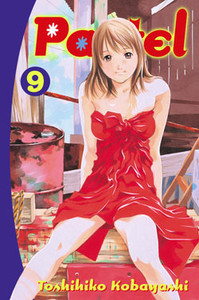Review
by Carl Kimlinger,Pastel
GN 9
| Synopsis: |  |
||
Ah, the languorous life of a shounen romance lead. Mugi may be weak, plain, indecisive, and look a full eight years younger than his actual age, but that doesn't mean that he isn't happy. He lives in the same house with Yuu, the love of his life, and cooks for her every day. What more could a guy want? Perhaps some real intimacy. After much hemming and hawing, some overly bold schemes by Yuu's sister Tsukasa, and with an extremely forceful push from his buddies, Mugi goes out with Yuu for his eighteenth birthday, intent on carrying out a blitzkrieg “hold hands, hug, and then kiss” operation to get closer to her. Is he doomed to fail? Is water weak? Are turkeys stupid and chickens cowardly? Mugi's delinquent best bud Kazuki is also turning eighteen, and it turns out that he's been waiting ten years for this day in order to confess to his beloved. But who has he been pining for? Could it be his longtime gal pal and frequent verbal sparring partner Manami? Is glass transparent? Of course Mugi has his worries too. Sayuri is getting married, and Mugi is having some abandonment issues. Will Mugi realize how important her happiness is and bless the union? Will the rhetorical questions ever stop? |
|||
| Review: | |||
After reading enough rote, predictable manga, one develops a faculty for ignoring tripe and focusing on the little enjoyable moments floating around in it. Kazuki's abrupt but deadly serious confession. A sweet sisterly display of affection between Tsukasa and Yuu. These moments leave a pleasant warmth behind when finished, but a quick calculation reveals the cold, hard truth about this book. Those moments total about seventeen pages. The book is two hundred long. That means under ten percent of the book is actually worthwhile. Which is to say that 90% of it is inconsequential tripe. That's a sobering number. In a series that has made its bread and butter by being as light, fluffy and uplifting as possible, it's no surprise that it only makes any real impression when breaking mold with a touch of bittersweetness. Kazuki's confession doesn't end well, and Yuu and Tsukasa's moment of bonding comes about due to their very different interpretations of the same sad childhood memory. Notice, however, that neither incident directly involves Mugi. That isn't a coincidence. Mugi is a ghost, a narrative placeholder, a good-natured blank slate onto which we are expected to project ourselves. By the way, isn't expecting us to project ourselves onto an oatmeal-bland nonentity just a sneaky way for the author to call us oatmeal-bland nonentities? At any rate, unless you happen to be an oatmeal-bland nonentity, it's almost impossible to care what happens to Mugi, so any attempted bittersweetness involving him ends up vanishing with an inaudible squeak of narrative despair. The rest of the book is comprised of humor so wan that it doesn't even deserve the label, puppy love so innocuous that even kissing is out of the question, and, of course, fan service. Toshihiko Kobayashi can create a real sense of place with his backgrounds, knows enough about pacing and paneling to emphasize and extend time during important events with spacious, well-placed one- and two-page layouts. But his real skill is fan-service, his forte the female form. He's smart enough to prevent it from getting pervasive, but you can practically see him hitting the proverbial slo-mo button whenever the clothes come off. He has a preference for curvy women with baby faces, so his female characters—especially the ones with similar hairdos—often look disconcertingly alike, but the hormonal teenagers most likely to enjoy his cheesecake insertions of nudity probably couldn't care less. A next episode preview promising plentiful swimsuit fan-service accompanies Del Rey's usual (and useful) translator's notes and short afterword by the author at the end of the book. In his afterword Kobayashi describes a meeting between a friend of his and a Korean actress. If his art is in any way representative, his friend is either spectacularly ugly or hideously deformed. Most people who expected more than mammaries, fannies, and weightless fluff from Pastel have long since abandoned the series, so if you've stuck with the series this far, you know—and probably to some extent enjoy—what this volume has to offer. But just in case someone missed it, I'll repeat the list: mammaries, fannies, and weightless fluff. Enjoy. The rest of us can now get busy forgetting it. Not that that'll be hard. |
| Grade: | |||
|
Overall : C
Story : D+
Art : B
+ Occasionally a (very mildly) bittersweet scene will succeed enough to make an impression, plus boobs and butts galore! Whee! |
|||
| discuss this in the forum (8 posts) | | |||
| Production Info: | ||
|
Full encyclopedia details about Release information about |
||